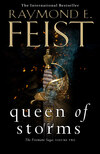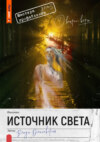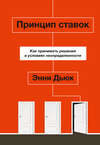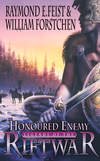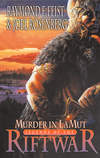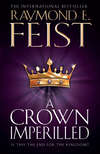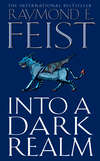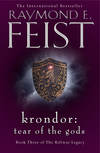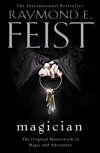Kitabı oxu: «The Firemane Saga»
QUEEN OF STORMS
THE FIREMANE SAGA: VOLUME TWO
Raymond E. Feist

Copyright
HarperVoyager
An imprint of HarperCollinsPublishers Ltd
1 London Bridge Street
London SE1 9GF
First published in Great Britain by HarperCollinsPublishers Ltd 2020
Copyright © Raymond E. Feist 2020
Map © Jessica Feist
Jacket design by Claire Ward © HarperCollinsPublishers Ltd 2020
Jacket illustration © Larry Rostant (from cover), Shutterstock.com (all other images)
Raymond E. Feist asserts the moral right to be identified as the author of this work.
A catalogue copy of this book is available from the British Library.
This novel is entirely a work of fiction. The names, characters and incidents portrayed in it are the work of the author’s imagination. Any resemblance to actual persons, living or dead, events or localities is entirely coincidental.
All rights reserved under International and Pan-American Copyright Conventions. By payment of the required fees, you have been granted the non-exclusive, non-transferable right to access and read the text of this e-book on screen. No part of this text may be reproduced, transmitted, down-loaded, decompiled, reverse engineered, or stored in or introduced into any information storage and retrieval system, in any form or by any means, whether electronic or mechanical, now known or hereinafter invented, without the express written permission of HarperCollins.
Source ISBN: 9780007541331
Ebook Edition © July 2020 ISBN: 9780007541355
Version: 2020-07-14
Dedication
To Rebecca and James,
This book is dedicated to the start of your great adventure together.
Love, Dad
Contents
Cover
Title Page
Copyright
Dedication
Map
Prologue: A Voice from within Shadows
Chapter One: Hunting and an Unexpected Encounter
Chapter Two: An Unplanned Event and A Surprise Reunion
Chapter Three: More Mysteries and a Short Journey
Chapter Four: Reflections and Bloodshed
Chapter Five: Celebration and Murder
Chapter Six: Destruction, Abduction, and Rage
Chapter Seven: Loss and Determination
Chapter Eight: Recovery and Resolve
Chapter Nine: Disasters and Questions
Chapter Ten: Captives and Mysteries
Chapter Eleven: Investigations, Discoveries, and the Unexpected
Chapter Twelve: Changes on Fate’s Tides
Chapter Thirteen: Plans and Consequences
Chapter Fourteen: Reversals and the Unexpected
Chapter Fifteen: Appraisals, Guesswork, and Repurposing
Chapter Sixteen: Revelations and Secrets
Chapter Seventeen: Voyages and Disasters
Chapter Eighteen: Choices, Chaos, and Change
Chapter Nineteen: Betrayal, Acceptance, and Piracy
Chapter Twenty: Planning and Resolutions
Chapter Twenty-One: Triumph and Escape
Epilogue: Reunion and Dark Harbingers
By the Same Author
About the Publisher
Map

• PROLOGUE •
A Voice from within Shadows
He was known as Bernardo Delnocio of Poberto, which was the first of many lies about him. His birth name had not been Bernardo, nor was he from a family named Delnocio. That family had been famous and powerful until a war took the last son; he claimed to be a distant cousin, from a lesser branch of the family, with no claim to any legacy but a once-noble name. Nor had he been born in Poberto, a prosperous town surrounded by the villas of the wealthy and powerful. That notable community rested just outside Brojues, the capital city of the Kingdom of Fondrak, home to the Church of the One. Instead, he had come from the poorest squalor of Aliestes, a minor city on the far continent of Enast many miles from the splendour of Brojues.
As a boy, the man calling himself Bernardo had been an abandoned guttersnipe, raised by a gang of urchins. He had grown up roaming the streets, surviving in a vicious world that provided few respites from struggle, living by his wits and a brutal determination to survive, until he had been recruited by the Church.
His natural combativeness and will to survive had been recognized and his early training had been channelled effectively into serving the Church. He had spent nearly ten years as a member of the Order of the Church Adamant, the martial arm of the Servants of the One, soldiers willing to die unquestioningly to defend the faith and, more importantly, attack its enemies without hesitation.
His will to survive had elevated him above the other soldiers, first by avoiding duty that would have trapped him in a permanent role, as a pioneer, engineer, or gynour, though he had been clever enough to learn a bit about building advanced entrenchments, rigging bridges and repairing roads, or operating siege engines, so he became as well-rounded as possible.
He had a knack for accents, and quickly improved his speech so that his common origins faded as he learned to adopt more refined rhetoric and behaviour. He soon became the youngest minor officer in the Church Adamant.
After only three years as a unit commander, he realized the true power wasn’t in the army, but being a cleric in the Church, and that was when his urge to survive had been transformed into a desire to thrive, rise, and become more powerful at every turn. He had surprised, even shocked, his companions when, as a rising young officer, he had announced he was leaving the Church Adamant to take holy vows and become the lowest of the clergy.
He did not remain a minor priest for long. Bernardo was not the most overtly aggressive player in the deadly internal politics of the Church of the One, but he had an intuitive grasp of something few did: he could quickly recognize the true organization of any group, where the power actually resided as opposed to ostensible ranks and titles. He identified those who were public figures and those who moved quietly in the background. Above all, he had a lethal instinct for when an opponent was vulnerable and no hesitation in taking advantage of that recognition.
He immediately understood that while the Council of the Episkopos was the governing body of the Church of the One, there was a handful of men within the Council who controlled every aspect of the Church. The Church priesthood had as many barriers and dead ends as the army had, and picking a path to power had given him a challenge, but surviving in the streets had proved a harsh yet enlightening education.
His natural skills and intuition meant he knew the right moment to act, and more than once he had managed to convince someone else to be responsible for the fall of one of his rivals. He merely suggested something and other people acted, and he made sure they believed it was their own brilliance that had led to the targeted rival’s downfall. Gang leader or powerful episkopos, he could apply his talents equally, discerning quickly who was truly loyal, or easily manipulated or even bought, who might become an ally, and who must be neutralized or even destroyed.
On the streets he had learned early which boys were bullies full of bluster. They came and went, often to an early grave or a slave gang, but the truly clever, the gifted, and thoughtful – they endured. Those were the ones he observed, and listened to, as he sought to survive.
Over the years Bernardo had also found it convenient to shape the truth of his past to suit the fluid politics of the Church of the One. Those who knew the inconvenient facts of his early life were either his closest supporters or dead. Ridding himself of potential enemies had sharpened his naturally keen intellect and driven patience into the very fibre of his being. He had waited months, even years, at times to see a rival dead. His imperturbability was almost legendary within the higher echelons of the Church in Brojues. He was now counted among the wisest of the rulers of the Church, and, by wide consensus, the most patient. Today, he was approaching the end of that patience.
More than once he’d come close to death either in the name of the One, or in establishing his place in the hierarchy of the Church, and right now he’d gladly return to those moments and embrace a quick death.
He sat silently in a large bedchamber in the castle of Lodavico, Most Holy Majesty of Sandura, ruler of the single greatest power on the twin continents of North and South Tembria. Getting Lodavico to sit motionless for hours had proved impossible, but Bernardo had managed to get him to sit for minutes at a time, a small but necessary step in Bernardo establishing complete control over the king and, through him, the Kingdom of Sandura.
The king sat as still as he could while a painter attempted to capture his magnificence on a treated board of cured wood. The artist was a captive from the city of Ithra, taken by one of Lodavico’s oathmen. He had managed to survive the destruction of Ithrace’s capital, avoiding death and slavery but not captivity. His name was Bantiago.
Bernardo watched closely as Bantiago deftly applied colour to the wood and through some artistic magic created a likeness of Lodavico that was flattering but not overtly false. Bernardo understood how the painter had survived the destruction of Ithrace. His superb talents had kept him from death.
Bantiago painted so well that he had been passed from one noble to another over the years, building a reputation and eventually living well by painting brilliant portraits of his captors. Despite still being considered a captive, Bantiago travelled with servants, most of whom were strikingly handsome young men, an apprentice, also handsome to the point of being pretty, and a token guard. It was a captivity to be envied by most citizens of Sandura, thought Bernardo.
These portraits were an Ithraci thing, a vanity that rather offended Lodavico, but gradually Bernardo had convinced him to sit for a portrait to commemorate his glory. Bernardo had studied Lodavico for more than a year before they met, and he had now been a member of the king’s court, his most trusted adviser, for a decade. He knew the monarch of Sandura had hated the way he looked his entire life.
The king knew he was often mocked for his appearance behind his back. His nose was slightly bent to the right, his left eye was marginally higher than the right, and his rare smile was noticeably lopsided. This asymmetrical visage, while not ugly, gave him an odd appearance that put people ill at ease for reasons they couldn’t quite fathom. Coupled with his gaunt frame, and a certain coiled energy that made it look as if he were on the verge of sudden violence, it meant few people were ever comfortable in his presence.
He had taken advantage of that discomfort his entire life, bullying his young siblings to the point of terror long before he took his father’s throne. All of them gladly accepted distant fiefs or convenient marriages to be as far from the court in Sandura as possible.
He had agreed to a portrait only at Bernardo’s quiet persistence. In all his life Lodavico had not met anyone he felt more at ease with than Bernardo. This had been achieved over years of Bernardo’s clever manipulation and the building of trust. There had been nights when Bernardo had simply wished to kill Lodavico, or possibly move to the other side of Garn, but in the end, he knew his persistence in winning Lodavico’s trust would win out. Now that trust was almost absolute.
Something about his manner, his solid presence, calmed Lodavico no matter how stressful the situation that faced him. He counted the episkopos’s counsel as vital, and after many years of having the cleric at his side in the king’s chamber, it was clear that Lodavico couldn’t imagine making important decisions without Bernardo’s advice.
For Bernardo, persuading Lodavico to sit for a portrait was just one more tedious tiny step into completely controlling the king, without him being aware of it. The episkopos knew that by the time this portrait hung in the great gallery of the castle, amid the banners and crests of Lodavico’s ancestors, the king would be convinced the portrait had been his idea, not Bernardo’s, which was exactly what Bernardo wanted.
Growing tired of posing, Lodavico said, ‘That’s enough.’ He stood and indicated for a servant to remove the heavy red cape with the ermine collar. He hated the vanity of the thing but had agreed with the artist that it made him look ‘regal’. Lodavico had finally relented and seemed to be growing fonder of the pomp, which was also in keeping with Bernardo’s plans.
Bernardo rose, feeling his joints protest slightly, reminding him that at his age, approximately fifty years (his exact date of birth was unknown), he needed to spend more time exercising. He had been lean and fit his entire life, adding muscle and sinew as a soldier, and had seen too many others of his rank let themselves run to fat. He would engage one of his retinue to spar with him early tomorrow morning; he was an episkopos, but he had been a soldier long enough to prefer duelling and wrestling to other forms of exercise. He was a tall, broad-shouldered man, and his dark hair was shot through with grey. He still looked as vital and energetic as a man half his age.
He wore the less formal clothing of his office, a black cassock with no trim, with black buttons down the front. His feet were clad in ankle-high boots of soft leather, and his only ornamentation was a silver circle brooch identifying him as a follower of the One, and a ring of office that adorned his left hand, another simple circle of silver, though set in the centre with a small ruby.
Vanity was not part of Bernardo’s nature, so his appearance was not designed to please himself, but to project an image he wished others to see. He wanted less to be noticed than to be a presence. More often than not it was a difficult feat.
He waited for servants to take away the heavy cloak Lodavico wore and for the king to move towards the door before falling in a half-step behind, on his left, a position of slight deference. Bernardo remind silent, for he could see the king’s mood was darker than usual for this time of the morning, even after one spent posing for his portrait.
Lodavico headed for his council chamber. As they approached down the long gloomy hall, bereft of any windows as it had been cut through the heart of Lodavico’s castle, shadows from torches in sconces flickered in grotesque parody of the king’s naturally awkward walk. Bernardo was aware of the shadows annoying the king, even though he had endured it since he came to the throne thirty years before. He occasionally wondered why Lodavico hadn’t ordered his architect to design some other type of lighting, but he didn’t linger long on the question; it was possible that Lodavico endured the daily passage as a reminder of his own self-loathing.
Entering the chamber, they found a tray laden with fruit, cold meats and cheese, a loaf of warm bread, a bottle of wine and a pitcher of cool water.
‘Good,’ said Lodavico. ‘I’m famished.’
‘Anticipating Your Majesty’s needs is always my aim,’ said the episkopos.
Lodavico indicated that Bernardo should sit in the chair to his right hand at the end of the council table. The Privy Council had consisted of up to a dozen nobles of the kingdom from dim antiquity right up to his father’s rule. Lodavico had named several nobles to various positions, but rarely convened the entire council, having only done so once after the war against Ithrace, just for public show. Most of the time he preferred to be in consultation with a few advisers at a time, and lately with just one of them: Bernardo. The truth now was, after a little over ten years together, the episkopos and the king made every decision in Sandura.
Lodavico said, ‘What news?’
Bernardo unfolded a leather portfolio he carried. He knew the king expected him not to discuss matters of state while his portrait was being painted, but now that they were alone, Lodavico was anxious to hear the day’s reports.
Bernardo had long since come to understand the king’s preferred order of reporting, and the usual accounts of trade, taxes, and other mundane matters were always subordinate to intelligence, news, and even rumours about anyone Lodavico considered a threat.
‘Little new to report on, Majesty. Some of the companies of mercenaries who’ve been employed in the north are taking ship to come and join your campaigns.’ He paused. A tightening around Lodavico’s eyes communicated clearly what the king desired to hear.
‘No news from Marquensas, Majesty. Our agents report … everything is calm.’
‘What about that … company Daylon assembled in that town …’
‘Beran’s Hill,’ supplied Bernardo. ‘Not really a company, sire, rather a local militia of sheriff’s men, though there is no proper sheriff. A young smith has been given command, a fellow named Declan.’
Lodavico waved away the detail. ‘Beran’s Hill is an invitation of sorts, I’m certain.’
Bernardo had listened to this conjecture countless times, but knew his best course was to simply let the king continue his speculation without interruption and to reassure him that everything that could be done was being done.
‘Daylon Dumarch has magnificent defences in every port, garrisons of size in key locations, cities, trade route intersections, and active patrols everywhere but in the north, along one particular trade route. Why?’
Bernardo hesitated, waiting to see if the question was rhetorical. Seeing that the king expected an answer, he shrugged. ‘He faces very little real threat from the north. His only neighbour of consequence is Rodrigo of Copper Hills, and he is one of Baron Daylon’s closest friends. Dumarch would as soon expect a brother to turn on him as Rodrigo Bavangine.’ He paused, gauging the king’s reaction.
Lodavico nodded. ‘The governors and rulers of the northern ports are scattered and more prone to welcoming smugglers and traders than armies. Besides, none of the ports are large enough to accommodate a flotilla that could put a substantial force at Marquensas’s rear. Port Colos is the largest, and it is so close to Marquensas’s border it might as well belong to Daylon.’ He stroked his chin, a habit Bernardo had seen countless times when the king was lost in thought. ‘Daylon is …’ He looked at the episkopos as if at a loss.
Gently, the cleric said, ‘I think he is taking care of what is his and guarding it.’
Lodavico shook his head. ‘No, I know he is planning something. He’s amassed wealth and has sway over many of the barons. He’s making Marquensas the new Ithrace. I’ve read the reports …’
Seeing that the conversation was taking a familiar turn, the cleric sat back, keeping his features a mask as he resigned himself to another pointless harangue about Daylon Dumarch’s close friendship to the dead king Steveren Langene, the ruler of Ithrace, real intelligence commingled with imagined slights and insults, turning into a rant invoking every possible reason to hate the most powerful baron in the twin continents.
When at last the king’s ramblings tailed off, Bernardo gladly turned the conversation to other matters the king needed to consider, not urgent, but important, and called in a scribe to record the king’s decisions. As the meeting came to a close, the episkopos waited for the king’s permission to rise – they had worked together so often, this amounted to the cleric inclining his head slightly and the king nodding – and as he stood, Bernardo said, ‘Majesty, I shall have the edicts recopied and returned before nightfall for your seal.’
‘I expect I should return to sit for that wretched artist. The sooner I’m done with this exercise in vanity, the better I’ll like it.’
Bernardo bowed slightly, and the king departed.
After the monarch was gone, the episkopos waved the scribe away, then lingered, enjoying the silence and solitude, if only for a few moments.
He refused to wallow in his transitory frustrations over dealing with a monarch who by any reasonable measure was on the fringe of madness. Bernardo Delnocio of Poberto had quickly recognized that Lodavico was a truly lonely man, hated even by his own family, surrounded by those who feigned loyalty and affection for him only out of fear. Rather than be another attention-seeker, Bernardo had patiently provided counsel and the Church’s support, ensuring that Lodavico became more dependent on him over each passing year.
Many times the king had asked the episkopos what he desired, to which Bernardo had always answered, ‘Only to serve,’ and every time a gift had been offered, Bernardo had declined it.
In truth, the gift came the other way; it was the cleric who gave the ruler what he most craved: Bernardo listened. No matter how preposterous or deranged Lodavico’s rant, Bernardo listened and the king needed this indulgence.
After Bernardo had spent almost two years on Lodavico’s council, the monarch had come to view him as the only being on all of Garn who didn’t hate him, fear him, or want anything from him, the only one who truly cared for his wellbeing. In short, Lodavico had decided that Bernardo was his only friend.
And this was when the manipulation had begun.
Over the last twenty years Bernardo had contrived to get rid of anyone who might prove an obstacle to his control of the king – a timely accident, an assignment to a particularly dangerous frontier post, a sudden illness. A great deal of patience had brought the cleric to almost complete mastery over the most powerful kingdom in North Tembria.
Bernardo could finally see his goal on the horizon: the Church’s control of Sandura, and his control of the Church. These two aims were intertwined, and he knew the closer he got to his goal, the more his deadliest foe would be his own impatience.
Should the cathedral under construction next to the king’s castle be completed in his lifetime, Bernardo already had plans to annex this monstrosity of a castle to it, tearing down walls, replacing dark corridors with passages of light, ancient dark stone with massive windows of the finest glass. He knew that would be completed years after he had left this existence but was content that whoever he appointed to follow him would share that view. When the Church was supreme, ruling over all Garn, there would be no need for castles, fortresses, or armies.
His plan extended beyond his own lifetime, which was more of a vainglorious desire to be remembered in the Church than for any personal gain. The rulers of Sandura would be so submerged in the culture of the Church that they would not realize this.
He heard the faintest rustle behind him, and knew he was no longer alone. Only a handful of men could move that quietly and of those only one would dare approach him unbidden. Without looking around he asked, ‘What news, Belli?’
Marco Belli, Bernardo’s most trusted and deadliest servant, spoke softly. ‘More rumours from the west.’
‘Marquensas?’
‘Yes.’
Bernardo turned to face him. Marco Belli, known as ‘Piccolo’ for obscure reasons, stood motionless before his master. He was a smaller man than Bernardo, but of less than average height, wiry and agile. Belli’s eyes were his most deceiving feature, for he could look innocent, or jovial, even while planning how best to kill you. He sported a red cap with a hawk’s feather, a dark blue tunic, and leather leggings. At his side hung a short sword, but Bernardo knew he was an expert in many other weapons. Piccolo was the only man the cleric fully trusted and would permit in his presence alone and armed.
‘Tell me about Marquensas,’ said Bernardo as he reseated himself.
‘For months now a town in the north of the barony, Beran’s Hill, has been very busy.’
‘This I know,’ said the cleric. ‘Rumours, little more.’
Piccolo nodded. ‘True, but persistent rumours, Your Eminence.’ He paused for a moment, as if gathering his thoughts. ‘There is no pattern nor is there any one item worthy of serious consideration, but in total …’
‘A design?’
‘Not apparently, but … something is taking shape. Though if someone is behind it, it isn’t obvious.’
Bernardo nodded. ‘Something is going on in that town.’ He also organized his thoughts before adding, ‘It’s where Lodavico and I expect the lure to be. If Baron Daylon expects Sandura’s attack, and with Copper Hills’s aid, he could trap Lodavico’s forces there.’
‘Lose the town, but win the war,’ agreed Piccolo.
‘Exactly. Lodavico loses a huge number of his military, enrages allies expecting an easy victory, and convinces others of Sandura’s perfidy when whatever excuse Lodavico dreams up is exposed as a lie, so it’s a victory both militarily and politically. At worst, Sandura is wounded and weakened, perhaps enough for old enmity to rise and former allies to turn on Lodavico. At best, Dumarch has allies ready and launches a counter-offensive …’ He spread his hands slowly and moved them outwards, as if wiping away game pieces from a table. ‘… leaves Sandura much as Lodavico left Ithrace …’ Bernardo let out an audible sigh. ‘And that we cannot have.’
Piccolo glanced around the dark room. ‘Can’t say I’d miss this castle.’
‘On that we agree. But when the cathedral is finished and blessed it will be the seat of the Church’s power in the twin continents. And that must be protected.
‘This war is inevitable, given our king’s obsession with all things related to the fall of Ithrace. Even the suggestion that Daylon Dumarch is becoming the next King of Fire …’ Bernardo paused. ‘I have little problem with them making war on each other. I just wish it to be on my terms, at a time of my choosing. Remember, the perfect plan executed at the wrong time has another name.’
Piccolo raised an eyebrow. ‘A disaster?’
Delnocio chuckled. Piccolo was as lethal an agent as he could have wished for, but he was also clever, and occasionally amusing. ‘Yes.’
Piccolo nodded; then he asked, ‘Do you wish me to go?’
‘I do not; I would rather keep you here, but I think there is a need. We have rumours of odd comings and goings. The agents of Coaltachin are apparently poking around, and they have no business we know of that far west. I’ve also received reports of … those who are best kept under watch.’
‘The Azhante?’
‘I still employ their services. They are not a risk … yet. They are the ones sending me intelligence.’
‘Whom do they suspect?’
As if fearful of saying the name too loudly, Bernardo almost whispered, ‘The Flame Guard.’
Piccolo’s shoulders dropped slightly. ‘Is there no end to them?’
‘Apparently not. Most we killed or captured when Ithrace fell. But …’ He moved his hands again, this time in a vague sweeping gesture, wiggling his fingers. ‘Some seem to have been carried away on the wind.’
‘A few,’ observed Piccolo.
‘But with … magic. Power. Whatever you wish to label it.’ Bernardo remained silent for a moment then said, ‘I don’t suppose there are any reports of a young man or woman with copper-and-gold hair, by chance?’
Piccolo shook his head. ‘Even if there were, that doesn’t make them true. A Firemane heir conveniently landing in Marquensas, or even more so in Beran’s Hill, would spur Lodavico to act rashly, I would wager. Even your influence would barely slow him. If that rumour suddenly sprouted up, it very well might be Dumarch’s lure.’
‘Yes, agreed.’ Bernardo’s brow furrowed slightly. Then he said, ‘Not if we steal a march, and look for the man or woman. Ensure the rumours are false.’
‘So, I should leave now?’
‘Yes.’ Bernardo stood up. ‘Go, take a thorough look, then return with haste. I need to know if any of the rumours are true.’
‘If they are?’
‘Do nothing. Observe, then come back and we shall consider our position. Send word by pigeon and courier, stating clearly the time you will arrive outside Beran’s Hill. Take an armed escort, but look as if you’re travelling as mercenaries, then meet our agent outside the town; whoever arrives first must wait for the other. I’ll leave it to you to work out the details. Now, go.’ He made a dismissive gesture, hand held fingers downwards, then a flip up towards the door.
Piccolo bowed and slipped through the hidden doorway. Bernardo was always slightly amused at his agent’s use of ancient passages not known even to the king.
Alone again, he put his mind to matters of the day. In the end the Church would rule Sandura and he would rule the Church, but until that time, he was His Most Holy Majesty’s loyal adviser. It was time to go and advise. Or at least sit feigning attention while watching a bored man pose for a portrait. And ponder this persistent rumour about a man with copper-and-gold hair in a small town half a world away.
